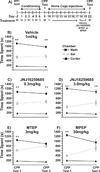mGluR5 is necessary for maintenance of methamphetamine-induced associative learning
- PMID: 22732517
- PMCID: PMC3473109
- DOI: 10.1016/j.euroneuro.2012.05.014
mGluR5 is necessary for maintenance of methamphetamine-induced associative learning
Abstract
Conditioned place preference (CPP) reflects the significance of contextual cues that are associated with rewarding effects of abused drugs such as methamphetamine (Meth). Glutamate neurotransmission is augmented following exposure to stimulants and associated cues. Activation of group I metabotropic glutamate receptors (mGluR) is critical for the acquisition and expression of stimulant-induced CPP. We hypothesized that the maintenance of Meth-induced CPP would also require activated mGluR, and that the role of mGluR1 vs. mGluR5 group I subtypes may differ. To test this hypothesis, negative allosteric modulators (NAMs) of these receptors were administered following the development of Meth-induced CPP. NAMs exert their functional effects by displacing agonist from agonist-occupied receptors, thus NAMs selectively target brain regions with glutamate release. Conditioning with Meth every other day for six days resulted in significant preference for the Meth-paired compartment. Two once-daily injections of the mGluR1 NAM, JNJ16259685 (0.3mg/kg, i.p.) or its vehicle on days 13 and 14 after Meth-conditioning did not influence the maintenance of Meth-induced CPP; however, administration of the mGluR5 NAMs MTEP (3mg/kg, i.p.) and MPEP (30 mg/kg, i.p.) inhibited maintenance processes necessary for CPP to be expressed. These findings suggest a subtype-specific role of mGluR5 receptors in the maintenance of place preference memory and potential of mGluR5 NAMs as a useful target for Meth addiction therapy.
Copyright © 2012 Elsevier B.V. and ECNP. All rights reserved.
Conflict of interest statement
Figures

Similar articles
-
Involvement of metabotropic glutamate receptor 5 in the inhibition of methamphetamine-associated contextual memory after prolonged extinction training.J Neurochem. 2016 Apr;137(2):216-25. doi: 10.1111/jnc.13525. Epub 2016 Jan 24. J Neurochem. 2016. PMID: 26748780
-
Brain region-selective cellular redistribution of mGlu5 but not GABA(B) receptors following methamphetamine-induced associative learning.Synapse. 2011 Dec;65(12):1333-43. doi: 10.1002/syn.20968. Epub 2011 Aug 31. Synapse. 2011. PMID: 21780181
-
Effect of fendiline on the maintenance and expression of methamphetamine-induced conditioned place preference in Sprague-Dawley rats.Psychopharmacology (Berl). 2014 May;231(9):2019-29. doi: 10.1007/s00213-013-3347-7. Epub 2013 Nov 22. Psychopharmacology (Berl). 2014. PMID: 24264565 Free PMC article.
-
Metabotropic glutamate receptor subtype 5 antagonists MPEP and MTEP.CNS Drug Rev. 2006 Summer;12(2):149-66. doi: 10.1111/j.1527-3458.2006.00149.x. CNS Drug Rev. 2006. PMID: 16958988 Free PMC article. Review.
-
The role of metabotropic glutamate receptor 5 in learning and memory processes.Drug News Perspect. 2005 Jul-Aug;18(6):353-61. doi: 10.1358/dnp.2005.18.6.927927. Drug News Perspect. 2005. PMID: 16247513 Review.
Cited by
-
Metabolomics profiling of methamphetamine addicted human serum and three rat brain areas.RSC Adv. 2019 Dec 12;9(70):41107-41119. doi: 10.1039/c9ra08096a. eCollection 2019 Dec 9. RSC Adv. 2019. PMID: 35540062 Free PMC article.
-
Neuroimmune basis of methamphetamine toxicity.Int Rev Neurobiol. 2014;118:165-97. doi: 10.1016/B978-0-12-801284-0.00007-5. Int Rev Neurobiol. 2014. PMID: 25175865 Free PMC article. Review.
-
Using conditioned place preference to identify relapse prevention medications.Neurosci Biobehav Rev. 2013 Nov;37(9 Pt A):2081-6. doi: 10.1016/j.neubiorev.2013.05.002. Epub 2013 May 13. Neurosci Biobehav Rev. 2013. PMID: 23680702 Free PMC article. Review.
-
Role of cues and contexts on drug-seeking behaviour.Br J Pharmacol. 2014 Oct;171(20):4636-72. doi: 10.1111/bph.12735. Epub 2014 Jul 2. Br J Pharmacol. 2014. PMID: 24749941 Free PMC article. Review.
-
The mGluR5 antagonist fenobam induces analgesic conditioned place preference in mice with spared nerve injury.PLoS One. 2014 Jul 25;9(7):e103524. doi: 10.1371/journal.pone.0103524. eCollection 2014. PLoS One. 2014. PMID: 25061818 Free PMC article.
References
-
- Anderson JJ, Bradbury MJ, Giracello DR, Chapman DF, Holtz G, Roppe J, King C, Cosford ND, Varney MA. In vivo receptor occupancy of mGlu5 receptor antagonists using the novel radioligand [3H]3-methoxy-5-(pyridin-2-ylethynyl)pyridine) Eur J Pharmacol. 2003;473:35–40. - PubMed
-
- Anderson JJ, Rao SP, Rowe B, Giracello DR, Holtz G, Chapman DF, Tehrani L, Bradbury MJ, Cosford ND, Varney MA. [3H]Methoxymethyl-3-[(2-methyl-1,3-thiazol-4-yl)ethynyl]pyridine binding to metabotropic glutamate receptor subtype 5 in rodent brain: in vitro and in vivo characterization. J Pharmacol Exp Ther. 2002;303:1044–1051. - PubMed
-
- Ary AW, Szumlinski KK. Regional differences in the effects of withdrawal from repeated cocaine upon Homer and glutamate receptor expression: a two-species comparison. Brain Res. 2007;1184:295–305. - PubMed
-
- Baker DA, McFarland K, Lake RW, Shen H, Tang XC, Toda S, Kalivas PW. Neuroadaptations in cystine-glutamate exchange underlie cocaine relapse. Nat Neurosci. 2003;6:743–749. - PubMed
Publication types
MeSH terms
Substances
Grants and funding
LinkOut - more resources
Full Text Sources
Other Literature Sources
Medical

